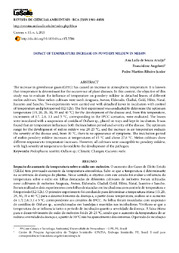Impact of temperature increase on powdery mildew in melon.
Impact of temperature increase on powdery mildew in melon.
Author(s): ARAÚJO, A. N. de S.; ANGELOTTI, F.; RIBEIRO JUNIOR, P. M.
Summary: The increase in greenhouse gases (GHG) has caused an increase in atmospheric temperature. It is known that temperature is determinant for the occurrence of plant diseases. In this context, the objective of this study was to evaluate the in? uence of temperature on powdery mildew in detached leaves of diff erent melon cultivars. Nine melon cultivars were used: Araguaia, Awton, Eldorado, Gladial, Gold, Hibix, Natal, Juazeiro and Sancho. Two experiments were carried out with detached leaves in incubators with control of temperature and photoperiod (12/12h). The first experiment was conducted to determine the optimum temperature (15, 20, 25, 30, 35 and 40 °C) for the development of the disease and, from this temperature, increments of 1.7, 2.6, 3.1 and 5 °C, corresponding to the IPCC scenarios, were evaluated. the leaves were inoculated with a suspension of conidia of Oidium sp., placed on trays and kept in incubators. It was found that air temperature in? uences both the incubation period and severity of the disease. The optimum range for the development of melon mildew was 20-25 °C, and the increase in air temperature reduces the severity of the disease and, from 30 °C, there is no appearance of symptoms. The incubation period of melon powdery mildew increases at temperatures of 15 °C and above 27.6 °C. Melon cultivars show diff erent responses to temperature increases. However, all cultivars were susceptible to powdery mildew, with high severity at temperatures favorable to the development of the pathogen.
Publication year: 2021
Types of publication: Journal article
Unit: Embrapa Semi-arid Region
Keywords: Doença, Efeito Estufa, Melão, Mudança Climática, Oidium, Oídio, Podosphaera xanthii
Observation
Some of Embrapa's publications are published as ePub files. To read them, use or download one of the following free software options to your computer or mobile device. Android: Google Play Books; IOS: iBooks; Windows and Linux: Calibre.
Access other publications
Access the Agricultural Research Database (BDPA) to consult Embrapa's full library collection and records.
Visit Embrapa Bookstore to purchase books and other publications sold by Embrapa.

